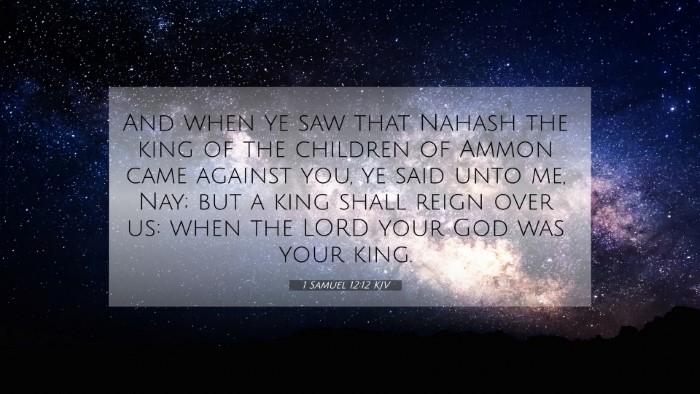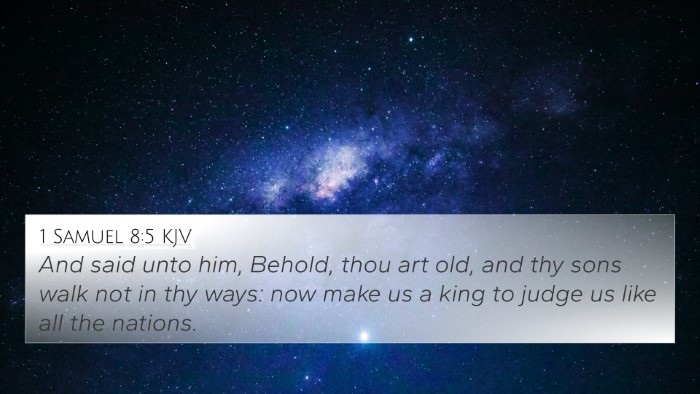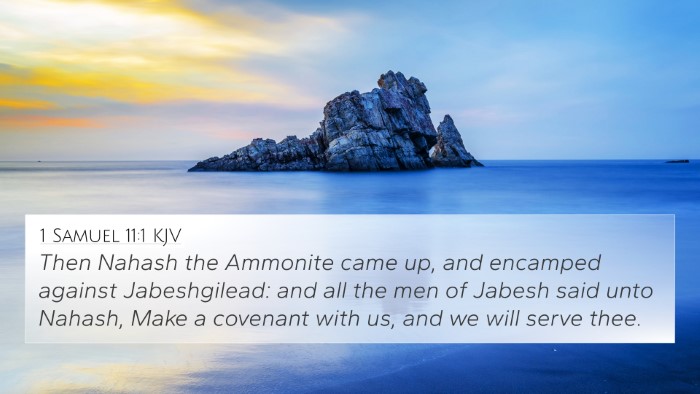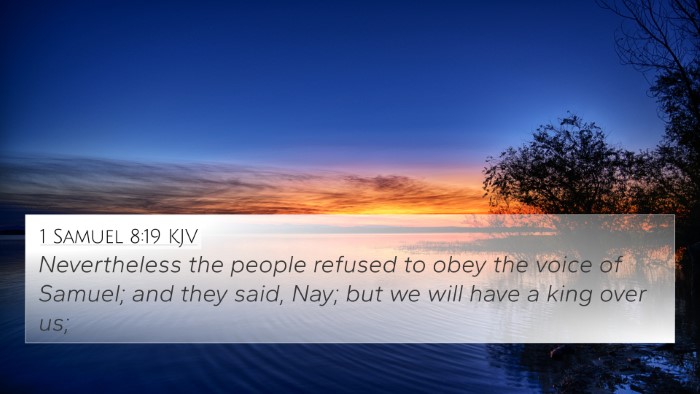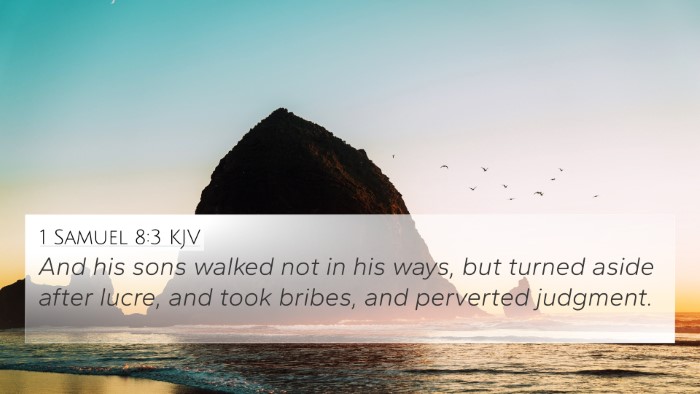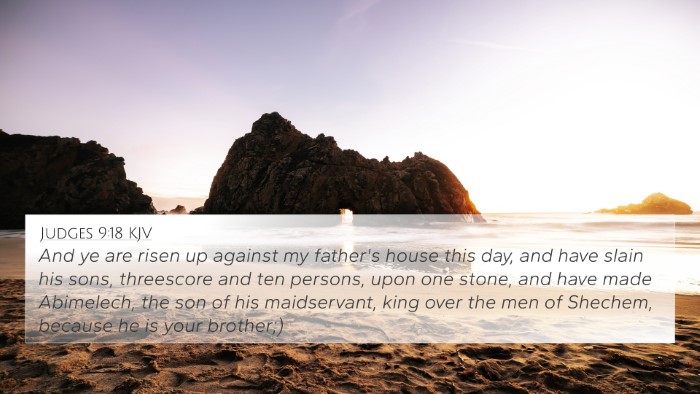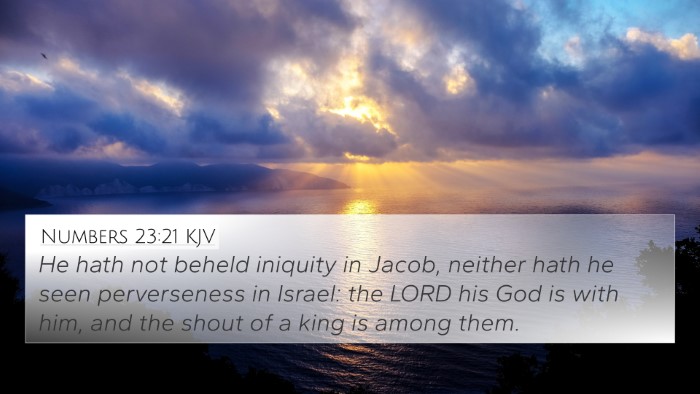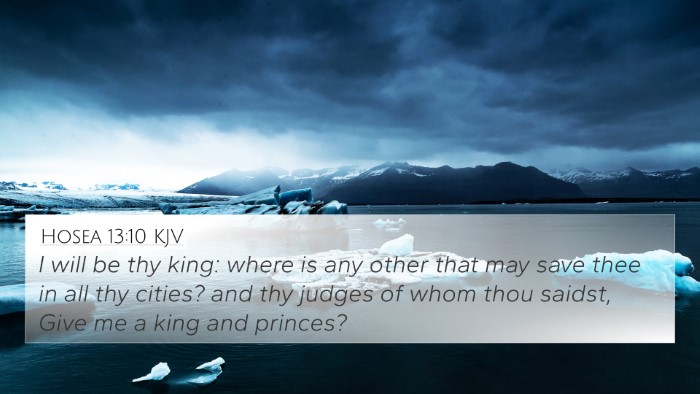Understanding 1 Samuel 12:12
The verse 1 Samuel 12:12 states, "And when you saw that Nahash the king of the children of Ammon came against you, ye said unto me, Nay; but a king shall reign over us: when the Lord your God was your king." This verse outlines a significant turning point in Israel's history, reflecting their desire for a human king instead of relying solely on God. Below is a combined insights summary from notable public domain commentaries.
Context and Background
This verse occurs during a pivotal moment as Samuel, the prophet, recounts Israel's request for a king. The Israelites had previously been led by judges and prophets, relying directly on God's guidance, but they sought a monarch to lead them in a manner similar to the surrounding nations.
Insights from Commentaries
- Matthew Henry's Commentary:
Henry emphasizes that Israel's demand for a king was rooted in their lack of faith in God's providential leadership. He suggests that their choice was not made out of a longing for a righteous king but rather to conform to worldly standards of governance.
- Albert Barnes' Notes:
Barnes highlights the significance of the people's rejection of God as their king. He notes that the request arose from fear when confronted by Nahash, showing their instability and the dangers of kingship when not sought with a heart aligned with God.
- Adam Clarke's Commentary:
Clarke notes the irony in the Israelites' demand for a king when they already had the ultimate King in the Lord. He provides context about Nahash and warns of the implications of selecting a human leader without divine consideration.
Thematic Exploration
This verse touches upon several important themes in the Bible, including:
- Human Leadership vs. Divine Sovereignty: The desire for a king illustrates humanity's tendency to rely on visible authority instead of divine guidance.
- Faith and Fear: The people's fear of external threats led to a decision that ultimately conflicted with their faith in God.
- Consequences of Choices: This decision set off a chain of events that resulted in long-term consequences for Israel's governance and relationship with God.
Cross-References and Connections
1 Samuel 12:12 is interconnected with several other verses, providing a more profound understanding of its implications and themes. Here are some critical cross-references:
- Deuteronomy 17:14-15: God's instructions on kingship, emphasizing the need for a king chosen by the Lord.
- 1 Samuel 8:5: The Israelites’ request for a king, expressing their desire to be like other nations.
- Hosea 13:10-11: A warning against seeking kings in times of distress instead of relying on God.
- Psalm 37:5-6: An exhortation to commit to the Lord rather than human rulers.
- Jeremiah 2:13: A reflection on Israel's abandonment of the true source of living water—God.
- 1 Samuel 10:19: Samuel highlights the folly of Israel’s rejection of God’s leadership.
- 1 Chronicles 29:10-11: Acknowledgment of God’s eternal kingship and sovereignty over Israel.
Comparative Analysis and Themes
This verse invites a comparative study of the biblical themes surrounding leadership, faith, and society:
- Identifying Connections Between Old and New Testament: The reliance on human authority is echoed in various New Testament teachings, such as the call for believers to trust in Christ as their King.
- Detailed Cross-Reference Between Gospels: The theme of divine kingship vs. earthly authority recurs in Jesus's teachings, particularly regarding His kingdom not being of this world (John 18:36).
Tools and Resources for Deeper Study
To explore these themes further, consider various tools for Bible cross-referencing that can enhance your understanding:
- Bible Concordance: A helpful resource for locating keywords and phrases across scriptures.
- Bible Cross-Reference Guide: This guides the user in finding related verses efficiently.
- Comprehensive Bible Cross-Reference Materials: Useful for in-depth studies on thematic connections.
Conclusion
1 Samuel 12:12 serves as a poignant reminder of the grave consequences that arise when humanity turns away from divine authority to seek security in worldly means. The insights from various commentaries highlight the importance of understanding the historical context and the underlying themes of faith, leadership, and the consequences of our choices.


